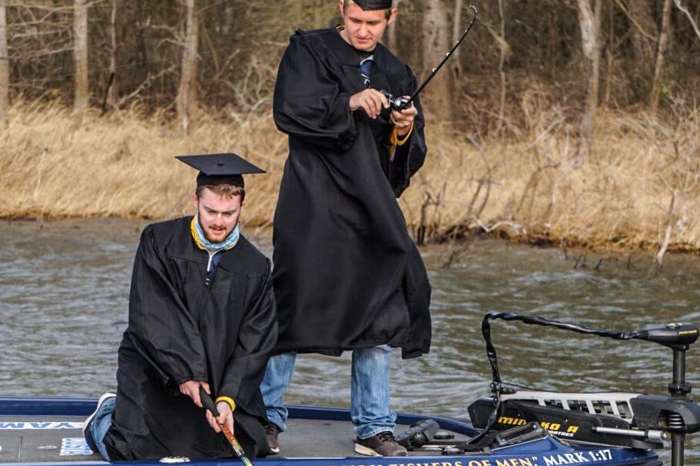In the realm of higher education, Colleges with Fishing Scholarships emerge as a beacon of opportunity for aspiring anglers. These institutions recognize the passion and dedication required to excel in the sport, offering financial support and academic recognition to talented individuals.
Dive into this comprehensive guide to discover the colleges that champion fishing excellence, empowering students to pursue their dreams both on and off the water.
From prestigious universities to specialized fishing schools, this guide provides an alphabetical listing of institutions that offer fishing scholarships, along with their locations and eligibility criteria. Whether you’re a seasoned tournament angler or just starting your fishing journey, this guide will help you navigate the application process, maximize your chances of success, and embark on an unforgettable academic and athletic experience.
Colleges with Fishing Scholarships
Colleges and universities across the country offer fishing scholarships to support students pursuing their passion for fishing while earning a higher education. These scholarships provide financial assistance and recognition to aspiring anglers who demonstrate exceptional skills, academic achievement, and a commitment to the sport.
The following is a comprehensive list of colleges and universities that offer fishing scholarships:
Institutions Offering Fishing Scholarships
- Auburn University, Auburn, Alabama
- Belmont University, Nashville, Tennessee
- Bethel University, McKenzie, Tennessee
- Bryan College, Dayton, Tennessee
- California State University, Sacramento, Sacramento, California
- Campbellsville University, Campbellsville, Kentucky
- Clemson University, Clemson, South Carolina
- Coastal Carolina University, Conway, South Carolina
- College of Charleston, Charleston, South Carolina
- Columbia College, Columbia, Missouri
- Cumberland University, Lebanon, Tennessee
- East Carolina University, Greenville, North Carolina
- Eastern Kentucky University, Richmond, Kentucky
- Florida Gulf Coast University, Fort Myers, Florida
- Jacksonville State University, Jacksonville, Alabama
- Kansas State University, Manhattan, Kansas
- Louisiana State University, Baton Rouge, Louisiana
- McNeese State University, Lake Charles, Louisiana
- Middle Tennessee State University, Murfreesboro, Tennessee
- Mississippi State University, Mississippi State, Mississippi
- Murray State University, Murray, Kentucky
- North Carolina State University, Raleigh, North Carolina
- Ohio State University, Columbus, Ohio
- Oklahoma State University, Stillwater, Oklahoma
- Oregon State University, Corvallis, Oregon
- Pennsylvania State University, University Park, Pennsylvania
- Purdue University, West Lafayette, Indiana
- Samford University, Birmingham, Alabama
- South Dakota State University, Brookings, South Dakota
- Southeastern Louisiana University, Hammond, Louisiana
- Southern Illinois University, Carbondale, Illinois
- Texas A&M University, College Station, Texas
- Texas Christian University, Fort Worth, Texas
- Texas Tech University, Lubbock, Texas
- The University of Alabama, Tuscaloosa, Alabama
- The University of Arkansas, Fayetteville, Arkansas
- The University of Florida, Gainesville, Florida
- The University of Georgia, Athens, Georgia
- The University of Kentucky, Lexington, Kentucky
- The University of Louisiana at Lafayette, Lafayette, Louisiana
- The University of Maine, Orono, Maine
- The University of Maryland, College Park, Maryland
- The University of Minnesota, Minneapolis, Minnesota
- The University of Mississippi, Oxford, Mississippi
- The University of Missouri, Columbia, Missouri
- The University of North Carolina at Chapel Hill, Chapel Hill, North Carolina
- The University of Oklahoma, Norman, Oklahoma
- The University of South Carolina, Columbia, South Carolina
- The University of Tennessee, Knoxville, Tennessee
- The University of Texas at Austin, Austin, Texas
- The University of Wisconsin, Madison, Wisconsin
- Virginia Tech, Blacksburg, Virginia
- Wake Forest University, Winston-Salem, North Carolina
- West Virginia University, Morgantown, West Virginia
- William & Mary, Williamsburg, Virginia
Scholarship Eligibility and Criteria
Fishing scholarships are typically awarded to students who demonstrate academic excellence, financial need, and a passion for fishing.
To be eligible for a fishing scholarship, students must typically meet the following requirements:
- Be a full-time student at an accredited college or university
- Have a minimum GPA of 3.0
- Demonstrate financial need
- Have experience in competitive fishing
Scholarship committees use a variety of criteria to select scholarship recipients, including:
- Academic achievement
- Financial need
- Fishing experience
- Leadership skills
- Community involvement
Examples of Fishing Scholarships, Colleges with fishing scholarships
There are a number of different fishing scholarships available to students. Some of the most popular scholarships include:
- The Bassmaster College Series Scholarship
- The FLW College Fishing Scholarship
- The National Collegiate Fishing Association Scholarship
These scholarships typically award between $1,000 and $5,000 per year to students who meet the eligibility requirements.
Application Process and Deadlines: Colleges With Fishing Scholarships

Applying for fishing scholarships typically involves submitting an application form, providing supporting materials, and meeting specific deadlines. It’s crucial to adhere to the application requirements and submit your application on time to be considered for the scholarship.
The application process and deadlines vary depending on the scholarship organization. Some scholarships may have rolling deadlines, while others have specific application windows. It’s essential to check the scholarship’s website or contact the scholarship provider for detailed information about the application process and deadlines.
Required Materials
Commonly required materials for fishing scholarship applications include:
- Completed application form
- Official academic transcripts
- Letters of recommendation
- Personal statement or essay
- Proof of fishing experience or involvement
- Additional supporting materials as specified by the scholarship provider
Application Timeline
The application timeline for fishing scholarships varies, but generally follows a similar pattern:
- Scholarship Announcement:Scholarships are typically announced well in advance of the application deadline.
- Application Period:The application period typically opens several months before the deadline.
- Application Deadline:Applicants must submit their completed applications by the specified deadline.
- Review Process:Scholarship committees review applications and select recipients.
- Award Announcement:Scholarship recipients are notified and awards are announced.
Tips for Completing a Strong Scholarship Application
To increase your chances of being awarded a fishing scholarship, consider the following tips:
- Start early:Begin working on your application well before the deadline to avoid stress and ensure you have ample time to gather all required materials.
- Proofread carefully:Ensure your application is free of errors in grammar, spelling, and punctuation.
- Highlight your strengths:Emphasize your fishing experience, skills, and accomplishments in your application.
- Get strong letters of recommendation:Choose recommenders who can attest to your character, academic abilities, and fishing skills.
- Write a compelling personal statement:Use your personal statement to showcase your passion for fishing and explain how the scholarship would support your goals.
- Follow instructions carefully:Adhere to all instructions provided in the scholarship application and ensure you submit all required materials.
- Don’t be afraid to ask for help:If you have any questions or need assistance with your application, don’t hesitate to contact the scholarship provider.
FAQ Resource
What are the eligibility requirements for fishing scholarships?
Eligibility requirements vary depending on the scholarship program, but typically include academic performance, financial need, and fishing experience. Some scholarships may also consider factors such as leadership, community involvement, and commitment to the sport.
How do I apply for a fishing scholarship?
The application process for fishing scholarships varies, but generally involves submitting an application form, transcripts, letters of recommendation, and a personal statement. Deadlines and submission requirements may differ, so it’s important to check with each scholarship program.
What are some tips for completing a strong scholarship application?
Highlight your academic achievements, fishing experience, and passion for the sport. Provide specific examples of your skills and accomplishments. Seek out letters of recommendation from individuals who can attest to your character and abilities. Proofread your application carefully and ensure that it is well-written and free of errors.




